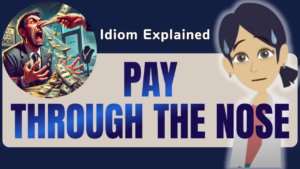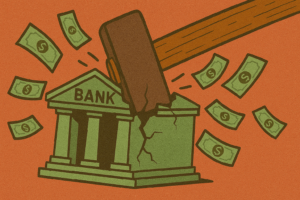Ever wondered why people talk about “breaking banks” when they’re just shopping?
To spend so much money that you exhaust your financial resources; to be prohibitively expensive.
This colorful idiom has nothing to do with bank robberies or physical destruction. Instead, it offers an imaginative way to describe spending that depletes your resources completely.

With roots in gambling history, “break the bank” originally referred to winning so much that the casino couldn’t pay out.
Today, it’s how we express financial strain without sounding dull or repetitive.
By mastering this phrase, you’ll sound more natural when discussing money matters in English.
Introduction
The expression “break the bank” has a long history, with roots that trace back to the world of gambling. It was originally used to describe a win so large that it exceeded the gambling establishment’s capacity to pay.
Over time, this phrase found its way into everyday language, coming to symbolize any purchase, bill, or endeavor that drains one’s finances.
While some people assume it involves dramatically smashing a bank vault, the idiom is more about being overwhelmed by the cost of something.
If you’ve ever felt your wallet tremble at a restaurant bill or a shopping receipt, then you understand the essence of “break the bank”.
Why It’s Worth Knowing



Mastering idioms like ‘break the bank’ will supercharge your English skills and help you chat like a native!”
“Break the bank” is particularly useful because it offers a colorful way of saying, “That’s too expensive” or “It will use up all my money.”
This single expression can help you convey a strong emotion about cost without sounding repetitive or dull.
Furthermore, idioms add personality to your speech. If you’re ever looking for a more emphatic way to mention a large expense, saying it “won’t break the bank” can provide reassurance that the purchase remains affordable.
On the other hand, if something will indeed “break the bank”, you can highlight how costly it feels without resorting to mundane words like “expensive” or “costly.”
Misconceptions & Clarifications
English idioms often lead to amusing misunderstandings. Imagine someone literally believing you’re about to rob a financial institution. It can spark a bit of comedic tension if you’re speaking to someone unfamiliar with the phrase.
However, once you understand that “break the bank” is metaphorical, the idiom becomes easier to grasp.
If your friend exclaims, “This gift is so expensive—it’s going to break the bank,” there’s no need to worry about an actual crime in progress. Instead, you can express empathy and tease them about their taste for high-priced items.
Keeping the tone light is often a good way to remember that idioms, even when they sound dramatic, usually have harmless meanings.
Note on Historical Usage
Some references mention that “break the bank” was used in gambling establishments as early as the mid-1800s.
Although the exact date of its first recorded appearance varies among sources, it gained popularity when large casino wins left the house struggling to cover payouts.
This drama captured people’s imagination, and the phrase soon slipped into everyday conversation to describe any financial situation where expenses risk overwhelming the available budget.
Understanding the Core Meaning
“Break the bank” essentially means to spend all of your money or to allocate more financial resources than you intended. It’s used when the cost of something feels so high that it strains your finances.
For example, you might say, “I’d love to buy that luxury watch, but it would break the bank.”
Practical Examples
- “I can’t afford that sports car because it would break the bank.”
- “This wedding is turning out to be so lavish; I’m worried it might break the bank.”
- “That new smartphone looks great, but upgrading right now might break the bank.”
In all these examples, the idiom emphasizes that something is prohibitively expensive or a potential source of significant financial strain.
Everyday Humor Moments



Remember, a little humor goes a long way! Use ‘break the bank’ to lighten the mood when talking about expenses.
Suppose you plan a small gathering for a few friends but accidentally order catering that could feed a crowd.
When the bill arrives, you might laugh and say, “Well, this dinner could break the bank, but at least nobody will go hungry!”
John’s House Hunt Story
Picture John, who dreams of purchasing a new home in a beautiful neighborhood. The property he finds, however, is priced so high that it could practically break the bank just to cover the down payment.
Despite the warning signs, he can’t resist the charm of the house.
John considers getting a loan, but he’s appalled when he sees the interest rate. He ponders borrowing from friends, only to discover they can barely donate enough for a simple rug.
Finally, he sells his old car and even parts with some cherished possessions. By the time he assembles enough money, John’s finances look perilously thin.
Miraculously, he finalizes the purchase. Now he jokes to everyone who visits that he spent so much money, he can only afford “invisible furniture.”
Although John’s story ends well, it underscores how “break the bank” conveys a sense of sacrificing almost everything for one major expense.
Lessons from John’s Journey
- Financial Limits: Even a worthy dream can push your finances to the edge.
- Sacrifices: Achieving a big goal sometimes calls for tough decisions.
- Humor: Finding the lighter side eases the strain of large expenditures.
10 Fun Facts
- Gambling Background: The idiom was originally linked to a win so large the house had trouble paying.
- Historic Popularity: It gained everyday usage in the 19th century, capturing people’s imaginations.
- Radio Influence: A show titled “Break the Bank” in the mid-1900s helped reinforce the phrase.
- Shopping Context: Many use this idiom to warn about excessive spending in a consumer-driven world.
- Financial Implication: It can imply taking a significant risk when investing or making big purchases.
- Global Reach: Speakers in many English-speaking countries use it to highlight hefty expenses.
- Advertising Appeal: Marketers sometimes claim their prices “won’t break the bank” to emphasize affordability.
- Negative Form: Saying something “won’t break the bank” reassures that it remains within a reasonable price.
- Media Usage: It frequently pops up in movies, TV, and general pop culture as a vivid way to discuss price.
- Figurative Spin: Some use it figuratively for impressive achievements, implying surpassing a limit or record.
Similar Expressions
If you’d like to convey that something costs a lot of money, these idioms and phrases might serve as substitutes:
- Spend a fortune: Implies using up a massive amount of money.
- Pay through the nose: Suggests paying far more than one considers fair or reasonable.
- Go over budget: Indicates surpassing a predetermined spending limit.
- Cost an arm and a leg: A dramatic way to say something is extremely expensive.
- Put a dent in one’s wallet: Emphasizes a significant, though not necessarily total, impact on finances.


Opposite Expressions
For situations where you want to describe saving money or staying within a budget, try these phrases:
- Save money: A straightforward expression meaning to keep funds rather than spend them.
- Be frugal: Involves exercising caution and restraint when purchasing.
- Live on a shoestring budget: Suggests having very minimal resources to cover expenses.
- Pinch pennies: Means to watch every coin, often to ensure you spend the least possible amount.
- Cut back: Refers to reducing overall spending to maintain financial stability.
Important Note on Usage
Sometimes, the context in which you use these expressions matters as much as the phrases themselves.
Saying something “costs an arm and a leg” is casual and a bit dramatic, which fits everyday conversation but might not suit formal business writing.
Conversely, phrases like “go over budget” or “cut back” are more neutral and often used in professional settings.
Story: Bold Startup Move
A friend once considered a risky startup idea but hesitated because the initial investment seemed like it would break the bank.
He even joked that he would need to “sell a kidney” to cover the expenses. Despite the trepidation, he decided to move forward, using every resource at his disposal.
Amazingly, his business flourished after overcoming early hurdles. Even though he “broke the bank” to get started, the reward justified the gamble.
This story reminds us that while the idiom tends to highlight the negative side of a high cost, sometimes that risk leads to a meaningful payoff.
Lessons Learned
- Courage in Finance: Significant rewards often require bold financial steps.
- Smart Strategy: Even if you’re risking a lot, planning thoroughly can help ensure success.
- Positive Spin: Although “break the bank” seems dire, it can result in major accomplishments.
Related Idioms
Broadening your knowledge of financial idioms enhances your fluency and cultural understanding. Here are some examples:
- Make ends meet: Balancing income and expenses, often under tight constraints.
- Tighten one’s belt: Reducing your spending because of a financial setback or a need to save.
- Be broke: Having little to no money available, often after paying bills or debts.
- Live hand to mouth: Surviving on a paycheck-to-paycheck basis with no extra savings.
- Rainy day fund: Savings set aside for unexpected future emergencies or costs.
Story: Making Ends Meet
Imagine Sarah, who lost her job and needed a clever way to make ends meet. She decided to turn her love of baking into a small online dessert business, using her grandmother’s recipes.
In a stroke of humorous irony, she named her venture “The Cookie Jar,” poking fun at her tight finances.
Before long, her business took off. She learned that creative thinking and the ability to tighten one’s belt during tough times could lead to success.
This story highlights how learning idioms goes hand-in-hand with discovering the resilience people show in real life.
Pop Quiz: Check Your Idiom Skills
Break the Bank

Conclusion and Key Insights
- True Definition: “Break the bank” means stretching your finances to their limit, often for a single purchase.
- Memorable Visualization: Imagine cracking open a piggy bank and scooping out every last coin.
- Similar Expressions: “Spend a fortune,” “Cost an arm and a leg,” and “Pay through the nose” capture the essence of heavy spending.
- Opposite Expressions: “Save money,” “Be frugal,” and “Pinch pennies” focus on conserving funds.
- Lasting Lesson: Sometimes, it’s worth the risk to “break the bank,” as long as you understand the potential consequences.
Feel free to incorporate these insights into your daily conversations.
Whether you’re talking about major investments or simply deciding on a weekend getaway, knowing when to say something “won’t break the bank” or that it “might break the bank” will make your English sound more vivid and authentic.
Keep practicing idioms, and you’ll find your communication skills growing richer with each new phrase you master.









Comment